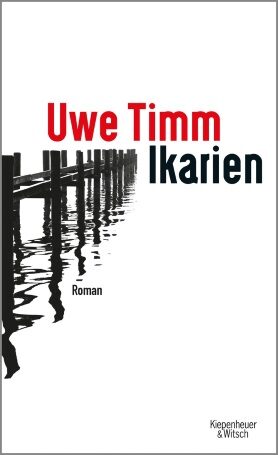Uwe Timm
Ikarien
[Icaria]
- Kiepenheuer & Witsch Verlag
- Cologne 2017
- ISBN 978-3-462-05048-6
- 506 Pages
- Publisher’s contact details
Uwe Timm
Ikarien
[Icaria]
Sample translations
The Downside of Utopia
The new novel by Uwe Timm revolves around racial theory and eugenics
Icaria is a longed-for destination. A commune where equality and brotherhood rule, where private property does not exist, where everyone works, studies, eats and celebrates together, where each person practices a craft and can be happy in his or her own way. At any rate that's how Karl Wagner and Alfred Ploetz imagine it on their way from Zurich to the USA in 1884 to visit the Icaria commune in Iowa for several months. Both young men, communistic students of medicine and economics, have read Étienne Cabet, the founder of the first Icarian commune, and are enthused by his ideas. A classless society, plenty of space, health, that would be just the thing! But the Icarians turn out to be pusillanimous, wizened members of the bourgeoisie, who pillory Karl for an innocent romance and accuse the visitors of having destroyed the commune. Nothing comes of the new commune. Ploetz, however, is only strengthened in his mission to improve humanity.
Uwe Timm has selected a historical subject to which he has a close connection: Ploetz, who dies in 1940 at the age of seventy, was the grandfather of Timm's wife, the translator Dagmar Ploetz. Ploetz, the physician as founder of eugenics; the concept of "racial hygiene" can be traced back to him. The historical and cultural background also permeates the novel, but Timm operates with a multiplicity of interruptions and mirrorings that make the whole bearable. On its own, accounts of racial theory with terms like "natural selection," "eradication" and "ballast life," could scarcely be endured for 500 pages. But Uwe Timm knows how to use narrative devices. So he doesn't allow the colorful character Ploetz to speak for himself, but invents an apostate travelling companion instead, the aforementioned Karl Wagner, and has him recount his friendship with the scientist. The elderly contemporary witness is interrogated by a man charged with investigating Nazi war crimes: an American occupation officer by the name of Michael Hansen, the third protagonist of the novel. This young man, a scholar of German literature, with Ernst Bloch and E.T.A. Hoffmann in his field kit, who emigrated with his family to America as a twelve year old, functions as site of value judgments. He combines analytic abilities, a cordial pragmatism and curiosity about the complexities of human life.
A rich and suspense-filled patchwork of narrative threads, settings, and types of text thus emerges. Sweeping descriptions of a devastated Germany alternate with the officer's brief and precise diary entries, with contrasting lyrical views of landscapes, bird-watching, and 14 protocols of interrogations. The original recording of the old man, whose tone turns conversational and loses itself on various paths, develops its own special power. There are constant undercurrents when the protagonists are involved in love affairs. Icaria's attraction arises from its oppositions: a USA sure of its future and a Germany fallen into barbarism, the revolutionaries of the Munich Republic of Councils and those breeding human beings under the Nazis, Ernst Bloch and Stefan George. In Icaria, Uwe Timm plumbs the depths of utopia.
Translated by Breon Mitchell

By Maike Albath
Maike Albath is a literary critic and journalist for the radio stations Deutschlandfunk and DeutschlandRadioKultur. She also writes for the newspapers Neue Zürcher Zeitung and the Süddeutsche Zeitung. Her books “Der Geist von Turin” (2010) and “Rom, Träume “(2013) were published by Berenberg Verlag.
Publisher's Summary
A multi-layered and engaging novel by one of Germany’s most important contemporary novelists and a fascinating journey into German post-war history. Like in Am Beispiel meines Bruders Timm takes real life characters like Alfred Ploetz – who coined the term "racial hygiene" – and asks big questions about the quest for alternatives to the status quo while at the same time painting a vivid picture of a country destroyed by war and an inhuman ideology and telling a moving story of a young man at the beginning of his life.
Germany, late April 1945: The American officer Michael Hansen, 25, returns to the land of his birth and accepts an assignment from the secret services: to find out what role the eugenicist Professor Ploetz played in the Nazi regime. While the war continues to rage regionally, Hansen takes up quarters on the Ammersee in Bavaria. In an antiquarian bookshop, he meets the dissident Wagner, an early companion of the scientist. Wagner tells him the story of their friendship, which began in Breslau at the end of the 19th century and took the two students, via Zurich, all the way to America – and right into the middle of the debate about the best social order: socialism according to Marx versus the utopian project of the community of Icarians, founded by the French revolutionary Étienne Cabet in America.
Through Wagner’s autobiographical confessions, Hansen discovers the Faustian pact that the racial hygienist Ploetz made with the Nazis and the very different fate that met the antiquarian because of his position of resistance. Hansen’s journey through the materially and morally decimated country allows him to witness the dawn of a new era that would shape German history. At the same time, it turns into an éducation sentimentale, with Hansen also learning some lessons about love.
(Text: Kiepenheuer & Witsch Verlag)
